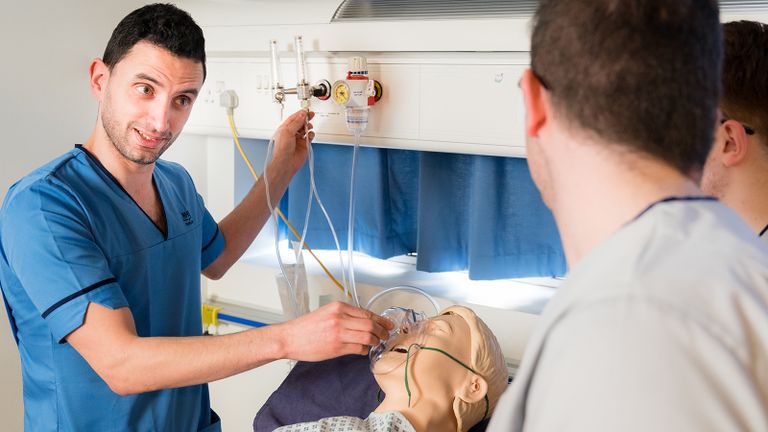Students can sample a smorgasbord of careers at Queen Margaret University (QMU) through a scheme that pairs them with four mentors. It is the latest employment-focused innovation from the university, which was founded in 1875 as a cookery school and named after St Margaret, the 11th-century wife of King Malcolm III of Scotland. QMU moved to its purpose-built campus in 2007 (the same year it gained university status) on the southeastern side of Edinburgh.
Food and hospitality teaching remains a strength and an entrepreneurial culture prevails at QMU, which has opened the Edinburgh Innovation Hub near campus with East Lothian council, bringing research, industry and academia under the same roof. The university has also welcomed a new chancellor, Patrick Grant, a designer more popularly known as a judge on The Great British Sewing Bee who has taken over from Dame Prue Leith, of Great British Bake Off fame.
QMU’s ambitions are big but the university remains relatively small, with fewer than 5,000 full-time students at the campus — creating a close-knit community feel.
What is Queen Margaret University, Edinburgh’s reputation?
QMU has recorded one of the biggest improvements in our main academic table year-on-year, gaining 39 places to rank 66th. It is a return to form fuelled in part by improved feedback in the latest National Student Survey, which puts it 47= for teaching quality (up 54 places) and 91= for the wider student experience (a 29-place gain) in our analysis. There has also been an upturn in good honours putting QMU in the top 20 for this metric.
QMU ranks 96th on the basis of the latest Research Excellence Framework (REF 2021). Some world-leading or internationally excellent work was identified in seven research areas. The best results were found in communications, cultural and media studies; speech and language science; and nursing and allied health professions.
Students are also able to work towards QMU qualifications at partner institutions in Kathmandu in Nepal, Tashkent in Uzbekistan and Colombo in Sri Lanka.
What degree courses have been discontinued and what new courses are available?
Two degree courses (media and communication; and public relations and marketing communications) are being withdrawn from 2025, and one (public sociology) from 2026.
A BA in digital and graphic design begins in 2026.
What are Queen Margaret University, Edinburgh’s entry requirements — and my chances of getting in?
Nearly all UK entrants are from Scotland and apply with Highers. Entry requirements for those sitting A-levels range from AAB to CCC. Contextual offers are typically two grades lower than standard.
What are the graduate prospects?
A mentoring scheme, an entrepreneur in residence and a new internship scheme offering students paid summer placements at the university are designed to boost graduate skills. But for now, with only 67 per cent of graduates in highly skilled work or further study 15 months after leaving, QMU is 111th in our analysis of the Graduate Outcomes Survey.
What is Queen Margaret University, Edinburgh’s campus like?
Facilities for living and learning are on QMU’s self-contained campus. The library has been upgraded and there is a new Outdoor Learning Hub especially useful for trainee primary teachers, but all students are welcome to connect with the natural world.
The Edinburgh School of Speech Therapy launched its new resource library for use by the Speech and Hearing Sciences staff, students, graduates and the field’s wider community.
As a specialist institution for the creative industries, QMU has performance and rehearsal space used for a busy calendar of student productions.
When can I visit?
qmu.ac.uk
Everything you need to know about Queen Margaret University, Edinburgh’s student life and wellbeing support
QMU’s tranquil campus in the seaside town of Musselburgh is only ten minutes by train to Edinburgh, with its culture and buzzing nightlife. Under a new partnership with the Edinburgh Fringe Festival, performers, writers, directors and producers from the Fringe stay in QMU accommodation, creating a “festival village”.
As well as the drama facilities on campus, QMU has everything students need to play sport and keep active — a large sports hall, fitness suite and studio, and floodlit all-weather outdoor pitch. There is also an outdoor gym in the university gardens, near the pond. Students struggling with their mental health can self-refer to the counselling and wellbeing service, which offers blocks of therapy up to six sessions at a time.
What do the students say?
“QMU lecturers have completely embraced who I am as a person, which has had a positive impact on my academic performance. There are fantastic opportunities to get involved in university life and to enhance your employability skills. I felt like I belonged.”
Joseph Marooth, BA student in international hospitality, tourism and events management
What about student accommodation at Queen Margaret University, Edinburgh
With 800 spaces, the university does not guarantee accommodation, but it prioritises disabled and care-experienced students as well as those from outside the EH postcode. Just less than half first-years (44.7 per cent) live on campus.
How diverse and inclusive is Queen Margaret University Edinburgh?
The university ranks third out of 15 in our social inclusion index for Scotland. It has the second-highest proportion of disabled students (7.6 per cent) and of those who are the first in their family to go to university (49.5 per cent).
Everything you need to know about scholarships and bursaries at Queen Margaret University, Edinburgh
In 2024, 13 of QMU’s 36 undergraduates from the rest of the UK (not including Scotland, which has its own funding system) qualified for university bursaries of £500-£2,000 a year. QMU also supports eight undergraduates to access the Robertson Trust Scholar Scheme, via match funding of up to £4,250 a year.
A small number of bursaries are available for student carers, those who have served in the armed forces and students who are estranged from their families.
